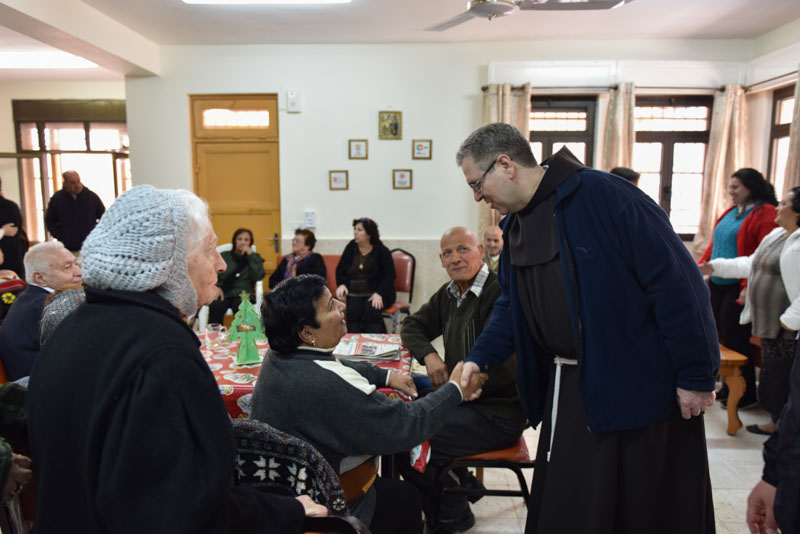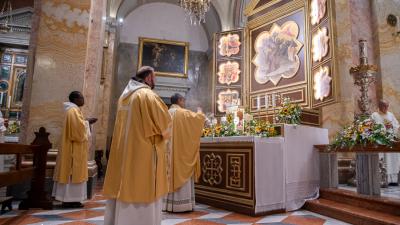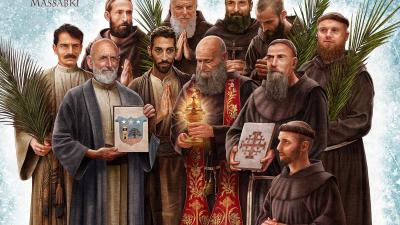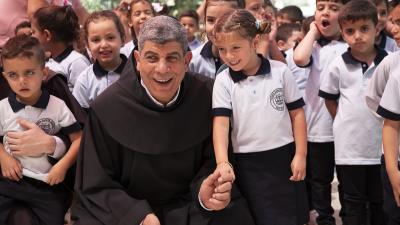
The collection made in all the churches of the world on Good Friday is also called: "Collection for the Holy Land." It was born to respond to the need to look for material aid in favour of the Holy Land, and as a result of the will of the Popes to strengthen the link between Christians the world over and the Land of Jesus. In view of the approach of this annual appointment, we have decided to interview the Economo of the Custody of the Holy Land, Fr. Ramzi Sidawi, in order to understand the importance of the Good Friday Collection for the Custody.
In what measure does the money available to the Custody of the Holy Land come from the Good Friday Collection?
The Good Friday Collection is essential for the life of the Custody. It covers about 75% of our annual budget. The donations made by some countries consist essentially in the money coming from the Good Friday Collection, while others make free donations.
How does this money arrive?
Normally the money arrives through the Commissaries of the Holy Land, who send the collection directly to us. At times, some bishops send the collection to the Apostolic Nuncios and they in turn send it to the Holy See. All the funds collected from the faithful all over the world are presented to the Congregation for Oriental Churches, which administers the Collection and devolves the greater percentage to the Custody, since it is entrusted with the care of the Sanctuaries. The rest of the collection is given to the other Churches of the Holy Land, since they also need to be helped.
Are there any formation meetings for Commissaries, in order to help them improve their work?
Yes, there are regular national meetings and sometimes also international meetings in order to sensibilise the Commissaries and update them on the situation of the Holy Land. Times change, and the challenges of a few decades ago are not the same as those we face nowadays. That is why there is a constant need for formation.
How are the funds of the Good Friday Collection used?
These funds are used both for the ordinary as well as the extraordinary running costs of the Sanctuaries entrusted to our care. The bulk of the funds are also used for the pastoral and social activities of the Custody. We are responsible for various parishes, schools and social initiatives in Bethlehem, Jerusalem, Nazareth.
How are the funds shared among these activities?
For ordinary administration the Custody has a fixed budget for each friary, for each entity, and for each administration. If these have incomes from other sources, they make use of the money they receive, or else the Custody of the Holy Land sends a monthly allowance according to a fixed quota. Each one of these entities is obliged to present a monthly and annual financial report.
Can you explain the situation of the work in the economato in these few months since you took over this office?
I have been Economo for four months and I have many things to learn. The amount of work is great since the Custody is an immense reality, which is present in many countries with diverse realities and innumerable problems, such as those concerning property, money, and the handling of personnel. With the help of Father Stéphane, the Custodial Vice-Economo, we will work on our human resources, in order to act in a way that can better respond to our reality.
The care of property is also an important duty. Nowadays, if you own a property, you have to take care of it in all kinds of ways, because lack of care means that, in various ways, you will gradually lose it.
There is then the question of the houses that the Custody rents to the local population. This is a very difficult and painful question, especially in Jerusalem. For a long time the Custody has been building houses and renting them to local families with a cost that is lower than that normally requested on the local market. This is a way in which we offer them the security of a home and help them to remain in this land. But we do not succeed in pleasing the wishes of everybody and answering all the requests. As soon as news spreads that a house is free from tenants, we receive tens of requests, but we can rent it only to one family.
If you had to explain to a person the reason for donating money for the Good Friday Collection, what would you tell them?
First and foremost I would speak about the need to take care of the Sanctuaries of our redemption. This was the intention of Francis of Assisi from the very first moment: that of living in, and taking care of, the Places where Jesus and his Mother Mary lived. For us these Places have become like a fifth Gospel. Next, I would speak of the need to take care of the Christians living in this land and of the need that they continue to live their faith. This is a help that is based upon the principle of solidarity: a Christian person shows solidarity, does not keep material goods only for oneself, but shares them with the brethren. Christians are invited to donate, and the Bible teaches us that there is greater joy in giving than in receiving.
Do you publish the financial accounts, and how is the money effectively spent?
The Church is often accused of not having public accounts, but this is not true and it is not precise to make such a statement. If a person who donates funds requests a report on how the money offering was spent, he or she receives such a report. This is a solid principle, which is never placed in discussion. The ones who donate money offerings can be individual persons or organisations. The Church is accountable for the money donations received, according to the modalities indicated by the person who makes them. Besides this, the Custody presents an audit of the Good Friday Collection to the Congregation for Oriental Churches.
We are in the hands of Divine Providence, which always responds generously to our needs.
Beatrice Guarrera




